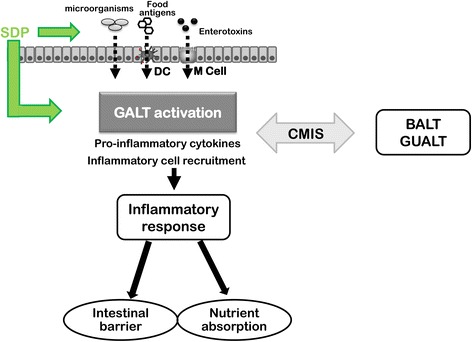Fig. 3.

Diagram summarizing the mode of action of spray-dried plasma (SDP). Food antigens and products from commensal bacteria can enter into the intestinal lamina propria across M cells (in Peyer’s patches), by dendritic cells (DC), or by paracellular pathway. This results in activation of the Gut-Associated Lymphoid Tissue (GALT), which induces an inflammatory response that can alter different intestinal functions such as intestinal barrier or nutrient absorption. GALT is interconnected to other mucosal surfaces like the Broncoalveolar-Associated Lymphoid Tissue (BALT) or the Genito Urinary-Associated Lymphoid Tissue (GUALT) by the common mucosal immune system (CMIS). Plasma supplementation can modulate the immune response at the luminal level (e.g.: modifying the microbiota profile, reducing antigen and pathogen concentration by luminal binding). Moreover, biologically active compounds present in plasma supplements can also interact directly with mucosal immune cells. The plasma-induced changes in mucosal cytokine profile can prevent or reverse deleterious effects resulting from immune system activation
